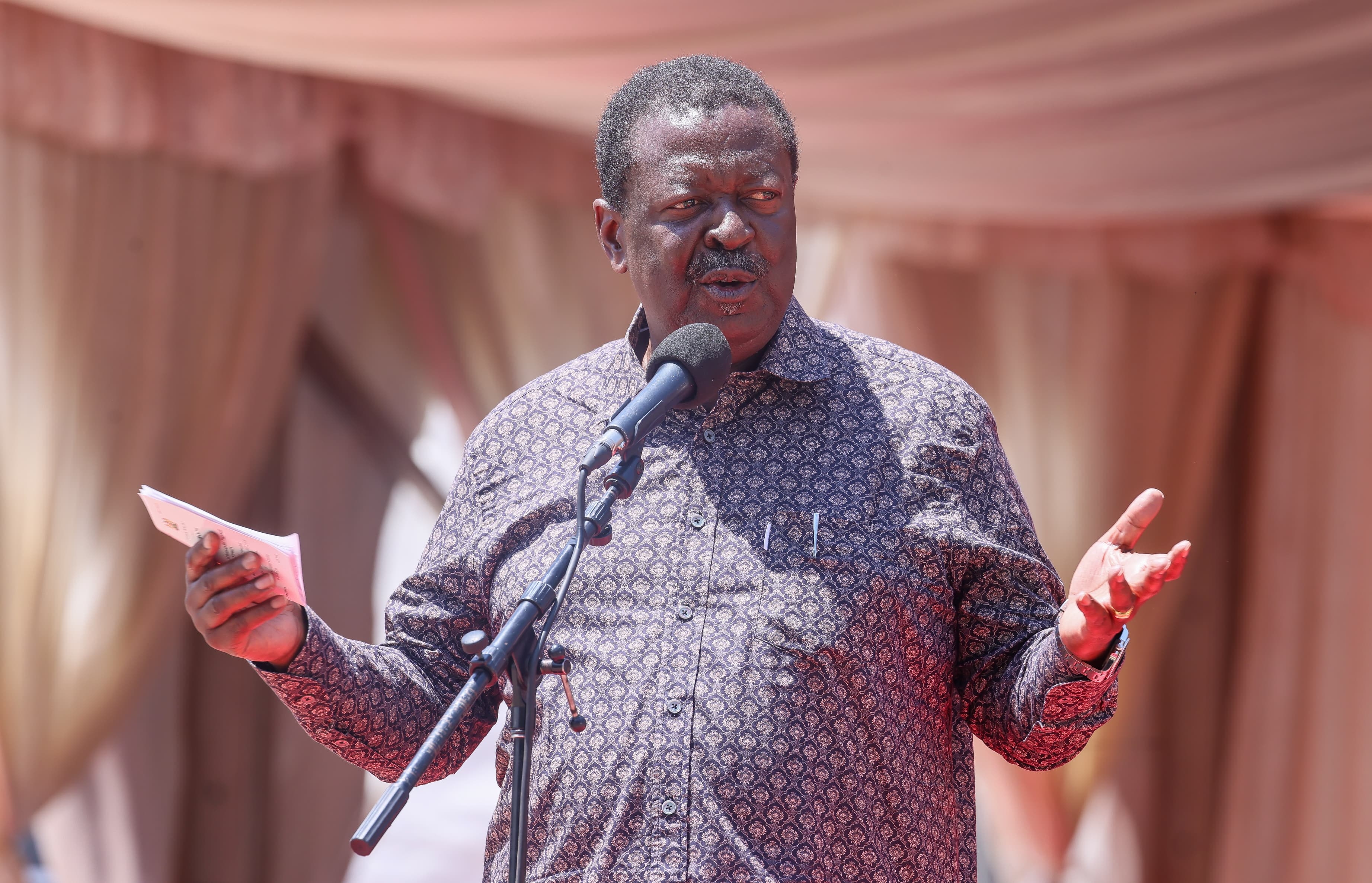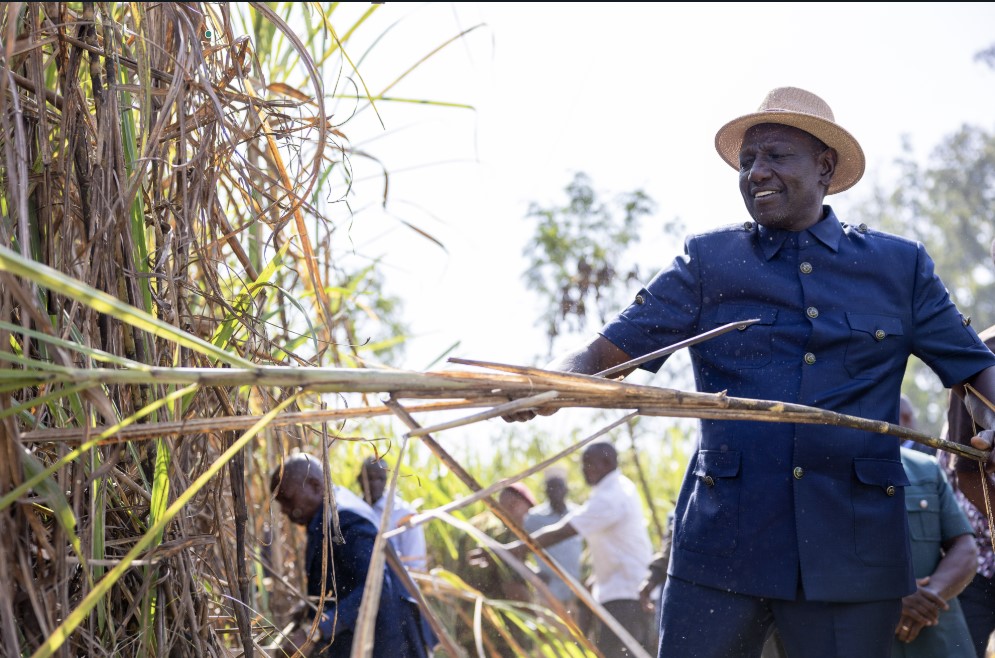

For decades, Atiang’ Atyang’ spearheaded a crusade calling for the government to rescue the sugar industry.
At the time, large swathes of cane fields were rapidly shrinking with hordes of disillusioned farmers desperate for alternative crops.
Misery and desperation set in as smoke stopped billowing from chimney after chimney in the Western Kenya sugar belt.
The supply chain, from farming, transport and processing was in shambles. Profits vanished and factories locked their gates.
Job losses and heavy debts kicked in triggered by cheap uncontrolled imports.
Every turnaround plan fell flat even as the government committed billions to resuscitate the factories back to their feet.
For thousands of farmers, cane had turned into a millstone around their necks. But not anymore, at least according to Atiang’, the national chairman of the Kenya Association of Sugarcane and Allied Products.
“Let us give President [William] Ruto credit for what he has done with the sugar industry,” he told the Star. For the farmer, the rebirth of the Kenya Sugar Board, the revamp of the sugar levy, debt write-offs, and board reforms were the magic wand.
“He (President Ruto) has done a good job. With debt write-offs [of more than Sh65 billion], he has set many public companies back to profit-making,” he said.
Atiang’ said the Ruto administration’s fertiliser subsidy has contributed to the high performance.
“The sector is thriving. There is a future for the industry. We now need to focus on maximising gains of the entire value chain,” he said.
With the new state support, the industry has been thrust headfirst into the centre of the 2027 Ruto re-election campaign.
Ruto has spent the New Year in the sugar belt, a clear sign that the region is vital for his political future after the troubles in Mt Kenya.
After the bitter and noisy Rigathi Gachagua divorce, Ruto’s trips to Central Kenya have been few and far between.
Keen political observers believe Western is the new Mt Kenya and sugar is the new coffee, tea and milk.
Reviving the economic mainstay of the region will surely earn him the platform from which to fight for reelection.
Sugar remains the key agenda of Ruto’s tours of Western culminating into the landmark announcement of a Sh150 million bonus to farmers.
The cash, Star’s research established, will benefit 12,501 farmers each of whom will get Sh6,700 while a further 2,371 farmers will receive Sh12,625.
The highest-paid farmer got Sh545,501, two earned Sh457,703, another two got Sh339,319, with four in the higher band receiving Sh237,000 each.
Another batch of 965 farmers got between Sh23,000 and 129,000 which added up to Sh33 million.
The handout triggered grumbles with critics questioning how the sum was arrived at the source of the large payout.
Opposition leader Kalonzo Musyoka of Wiper asked, “Where is the Sh150 million coming from? If it’s a bonus it needs to come through the processes.”
“Let Western people know that they are being lied to, the same way we were lied to when Ruto camped here in Mt Kenya,” Kiambu Senator Karungo Thang’wa said.
But to allay those fears and set out the facts, Ruto said, “Where the tea and coff ee bonuses come from is where sugar bonus came from, so that farmers are equal.”
Pundits say the bonus remains a major milestone for sugar famers which will morph into pressure for private millers to up their game.
While dismissing the naysayers, Kakamega Senator Boni Khalwale said the entire region was optimistic more progress will follow.
“The President has made a groundbreaking decision. There is no factory that pays a bonus. You have set a standard. Let the other companies follow suit,” he said.
For the government, agriculture, livestock, fisheries, the blue economy and mining value chains would be prioritised.
Musalia Mudavadi, the Prime Cabinet Secretary, announced the development would restore the hopes of thousands of disillusioned farmers and claimed corruption was a major issue that ought to be tackled.
“The people of Western have been patient, immeasurably, over the years trying to fi nd alternative livelihoods. We will ensure the sugarcane farmer will benefit fully from their sweat.”
A brief by the Kenya Sugar Board reveals the government invested Sh600 million to supply planting material produced by the Kenya Sugar Research and Training Institute.
It also emerged that the Sugar Act, 2024, has put a stop to endemic cane poaching and put in place a pricing committee to develop a bonus payment system.
Farmers are worried that the gains may not be sustained if the management of the mills remains unchanged.
For starters, the KASPA chairman, Atyang’, wants Ruto to kick out politicians from director roles in public mills.
“Sycophancy should be stopped. The improvement will not be sustained and will be a pipe dream as long as the governance is bad,” he said.
It is emerging the government is working on a sugar traceability system for the safety and health of consumers.
Deputy President Kithure Kindiki said the development was historic and that farmers can look forward to more bonuses like their Central Kenya counterparts who enjoy tea and coffee cash every season.
“Boosting manufacturing and industry is one of the engines that will take our country from where it is to the fi rst world,” Kindiki said. “Industrialisation is the key to creating the nation’s wealth.
Growing our manufacturing and industrial sector is part and parcel of our manifesto,” the deputy president said.
The Kenya Kwanza administration would put more money into transforming agriculture, livestock, mining and blue economy value chains.
“Most of our people derive their livelihoods from these value chains. We are on the right trajectory towards Kenya’s transformation,” Kindiki said.
Kakamega Governor Ferdinand Barasa said with the sector taking an upward trajectory, the value chains have to be explored.
“The sugar reforms are historic. Mumias Sugar is the economic livelihood of the Western region.” “We are happy the President has taken it up. If we sort arrears of the farmers, the region will not be the same again,” the governor said.
Majority leader Kimani Ichung’wah said it was regrettable critics have cast doubt on the pledge. “We are glad to be producing enough sugar, including for export,” Ichung’wah said.
The Kikuyu MP said the events were a testament that Kenya Kwanza would deliver to Kenyans, especially farmers.
The lawmaker dismissed the notion that President Ruto used public coffers to raise the Sh150 million bonus Mumias farmers got.
“At no time have we set aside money for bonuses. Mumias Sugar Company generated the bonus and this has been the prayer of the people here,” Ichung’wah said.
Kenya Sugar Board says the setting up of cane testing units in the country’s 11 sugar companies also sufficed.
The testing centres take data on the sucrose content of cane more than the gross weight which had been used to calculate farmers’ payments.
For the farmers, the President’s declaration stopping imports also helped and firmed up a court order KASPA had secured on the same.
A court put a halt to imports, pushing the local sugar production to 832,000 tonnes in 2024, up from 472,773 tonnes in 2023.
Kenya cut sugar imports to below 10 per cent of annual demand, with plans for surplus production by 2026.
KSB data shows that imports reduced significantly from 608,178 tonnes in 2023 to 339,345 tonnes in 2024.
“The demand-supply gap is closing up and by 2026, Kenya is expected to become a net sugar exporter,” KSB said.
President Ruto has restated he
has set eyes on improving the income of households that depend
on sugar.











